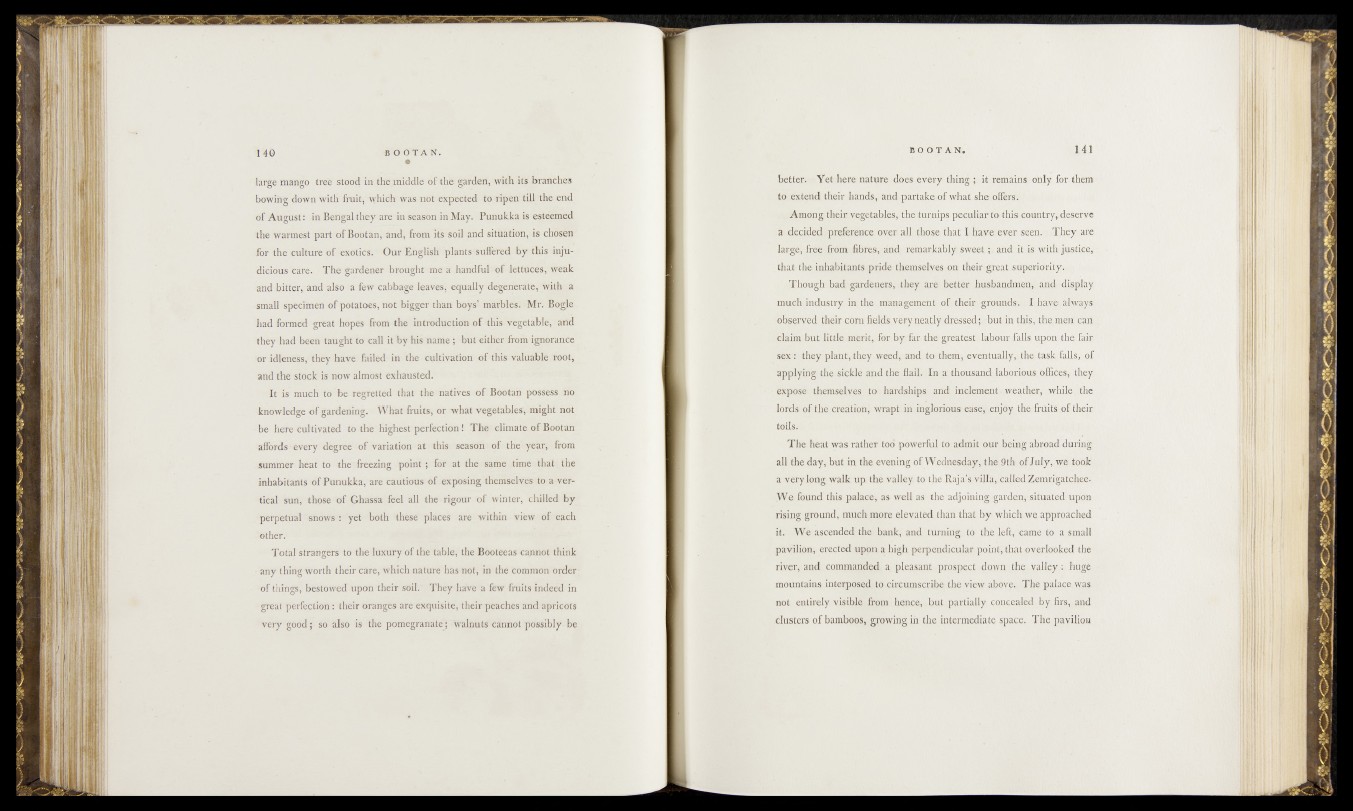
large mango trefr stood in the middle of the garden, with its branches
bowing down with fruit, which was not expected tp 'ripen' till the end
of August: in Bengal ttey^ere in season in May. Punukka is esteemed
the warmest part of Bootan, and, from Hs soil and situation, is chosen
for the culture of exotics. Out English plants suffered by this injudicious
care. The gardener brought me a handful: of lettuces, weak
and bitter, and also a few cabbage leaves, equally degenerate, with a
small specimen of potatoes, not bigger than boys’ marbles. Mr. Bogle
had formed great hopes from the introduction of this vegetable, and
they had been taught to call it by his name; but either from ignorance
Or idleness, they have failed in the cultivation of this valuable root,
and the stock is now almost exhausted.
It is much to be regretted that the natives of Bootan possess mo
knowledge of gardening. What fruits, or what vegetables, might not
be here cultivated to the highest perfection! The climate of Bootan
affords every degree of variation at this season of the year, from
summer heat to the freezing point; for at the same time that the
inhabitants of Punukka, are cautious of exposing themselves to a vertical
sun, those of Ghassa feel all the rigour of winter, chilled by;
perpetual snows : yet both these places are within view of each
other.
- Total strangers to the luxury of the table, the Booteeas cannot think
• any thing worth their care, which nature has not, in the common order
of things, bestowed upon their soil. They have a few fruits indeed in
great perfection: their oranges are exquisite, their peaches and apricots
very goodso also is the pomegranate; walnuts cannot possibly be
better. Y,et< here-nature doss^eyèry^thingt ;* it remain^. bipLy, fpr them
to extend jt-bnirÿhailda, and partake of what she offers.
Among thej%vegetables, the turnips peculiar toi tb/sj.coiàn'tn ,td,escrve
h. decided, preference oven; all,^tfrose tbaffr h^elhvcr^sCtd^Tbey a-te
large, free from,fibres,, and remar.kabl^sfwïeâi, ài.aùd;it is vviih justice,!
| thafpfthe inhabitants pride tfremselyes on their jgrea^.,sdp.'efj,9^yf-J4j .
Though bad‘,gaTdjenerSi..they'.^rb bette^busbandtiien^ and^displày
much industry in the management of, their. grbùnü s.‘uÆ hawssalwa) s
’©brewed their corn fieldsyg^^e^fely dressed; 'butin this,,bhegiu.e;il!can»
claim but little merit* for by far, thei greatest lgjhgui lulls upon the fan*
sex : theyiplanfVtlaey weed, and to them, e v e n t u a l l y t as-feifajfs&of
applying the sickle and the flail. In a; thousand 1 aboriqussbf&ce$,tfheyf
exposé' themselves to hardships and inclement weather,-.while, tli<£
lords of the creation, wrapt in inglorious easq&epjoy the fruits,,,of their,
tdiis&v if
The heat was rather too powerful to . admit our being abroad during;
all the day,-but in the evening of Wednesday, the* 9 th of July, we took?
a very long walk up. the valley, to the Raja’s villa, called Zemri'gatcheêij
yVe found this palace, as well,a<Sythe adjoining -garden,--situated upon
rising ground, much more elevated than that,by which wq appipScbad
it. We ascended the bank, and turning to thè.left, 'camfe to! aj small
pavilion, erected upon a high perpendicular point,' that^pjlppked the
river, and commanded a pleasant prospect down the,_ yidley ; huge,
mountains interposed to circumscribe the view above-.j-Thç palacevyas
not entirely visible from hence, but partially conGe^d^te firs,, and
clusters of bamboos, growing in the intermediate space. The pavilion